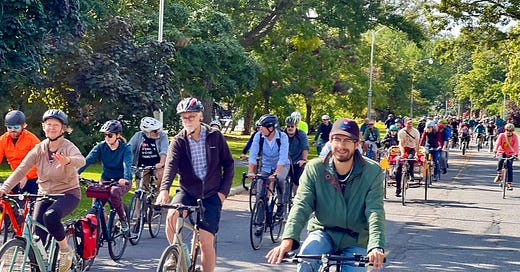What Ottawa City Hall Needs to Do Before You Can Do Your Part on Climate
City Hall action is required to unlock community action for reducing emissions.
Waiting for City Hall
Chances are you’re ready to do your part in reducing carbon emissions.
But for residents to tackle the primary sources of emissions in Ottawa — transportation and buildings — it is often impossible or impractical for us to act until City Hall has first delivered some foundational pieces.
City Hall is a catalyst for community action
City Hall “corporate” operations only account for 4% of carbon emissions in Ottawa. And this Council seems to think that its responsibilities extend only to reducing these corporate emissions.
But City Hall has a catalytic role in unlocking the other 96% of “community” emission reductions — from households, businesses and organizations.
Here’s some of what City Hall needs to do first, before households, businesses and other organizations are in a position to take their own climate action.
Transportation
One-third of all greenhouse gas emissions in Ottawa come from vehicles. For the people of Ottawa to be able to take transportation-related climate action, we need action from City Hall first in the following areas.
Provide choice in how we travel
Many people in Ottawa feel like their only option for getting around town is to drive.
Our transit system has become a “last choice” option. Biking is not considered sufficiently safe by most adults or kids.
Before we can act, Council has to make transit and biking competitive modes of travel. By extension, this means also making driving relatively less attractive, through parking prices, traffic restrictions and road redesigns.
Install EV charging on public facilities and streets
Not everyone has the luxury of being able to charge an electric car at home. Accordingly, as internal combustion engines are phased out in Canada, public charging stations will be required, including in municipal parking lots and on city streets.
The City has largely outsourced EV charging to third parties, resulting in poor coverage and expensive offerings. There are relatively few facilities on city properties and charging rates are double those in neighbouring Gatineau.
We will need the City to provide more charging facilities on municipal streets and properties, and at more affordable rates, for all car owners to have viable options for charging.
Buildings
Heating and cooling buildings accounts for over 40% of total emissions in Ottawa. For the people of Ottawa to be able to take buildings-related climate action, we need action from City Hall first in the following areas.
Make retrofits easy
Retrofitting a home or commercial building to be more energy efficient is a money-saving opportunity, particularly when coupled with government grants to help pay for those retrofits.
But getting those retrofits done requires building owners to essentially become experts in energy efficiency measures, and it requires owners to front a large sum of money.
Cities can create loan programs to solve the financing question, as Ottawa has piloted previously.
But perhaps more important is for City Hall to provide a service whereby a third party project manager oversees multiple retrofits throughout a neighbourhood — taking the technical burden off the shoulders of owners. Imagine all the homes on your street being invited to join a retrofit program, managed and even financed up-front by a team of professionals ensuring you get the best and cheapest solution possible.
European countries and some US states have adopted this Energiesprong model of aggregating multiple retrofits into a single project and arranging financing such that upgrades are paid through future energy cost savings. This aggregated approach dramatically increases the number of retrofits that get done and expands the opportunity to lower-income families.
Require high performance development standards
Our Climate Change Master Plan, and by extension our Official Plan, calls on Ottawa to adopt a green building standard for the construction of new homes. These high performance development standards, which have been in force in Toronto for over a decade, might raise the construction cost of a new home by 1% to 10% but pay for themselves through lower energy bills.
Ottawa was due to adopt high performance development standards in 2023, but Council chose to delay their implementation.
Mayor Sutcliffe said at the time that this delay was at the request of the Ontario Minister of Municipal Affairs and Housing. Others felt it was due to pressure from developers who wanted to keep the sales price of new homes as low as possible, even if that would result in higher total costs for homeowners through higher energy bills.
Regardless, Ottawa Council is overdue on bringing the high performance development standard back to a decision point. Residents will, as a result, be buying into new homes that are normally less energy efficient with a higher total cost of ownership.
Will City Hall act?
City Hall is at a fork in the road. It has two options for climate action.
City Hall can focus on its corporate emissions — those emissions resulting directly from it own operations — and work to reduce those towards net zero.
Or, City Hall can follow its Climate Change Master Plan, and additionally do what only a municipality can do to enable residents to take their own climate action.
Focusing solely on corporate emissions is the easy way out. But it’s a failure of leadership. It’s also a failure of City Hall to provide the essential services required by its residents — in this case, the services required so that we can take our own climate action.
Under Mayor Sutcliffe, all indications are that it will ignore its own climate change plan and go with Option 1, the easy way.






It strikes me that Mayor Sutcliffe blames a lot of other levels of government for City of Ottawa’s failure to act (or delays). But where’s the evidence? Since mainstream media in the city don’t investigate his claims, he is free to say whatever he wants. I’d say that’s rewarding bad behaviour.